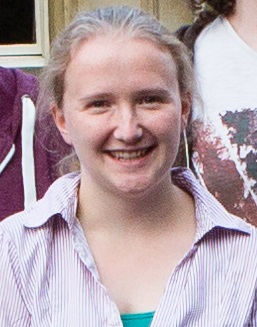You are here: Centre for Doctoral Training in Molecular-Scale Engineering > Our Students > Niamh Ryall
Niamh Ryall

Background
I studied at the University of York, where I graduated with an MChem in Chemistry.
Previous lab experience
My third year project was in spectroscopy, something I was always interested in. I completed my fourth year project at Infineum UK in Oxfordshire. I really enjoyed working there and learnt a lot about polymer chemistry.
Why I chose to study in the CDT in Molecular-Scale Engineering
I liked the idea of broadening my horizons and working across traditional disciplines. Nanotechnology spans physics, chemistry and biology and engineering and you find the people working within it are from very diverse academic backgrounds.
Also, CDTs have continuous training integrated into the course and this seemed an advantage. There was also the opportunity to pick a project from a range of disciplines, with lab rotations in order to see what each project was really like.
Current research
I work in a small group in Leeds, half of which looks at solar resources. My half looks at the use of silver nanowires in solar cells. I am trying to create TiO2 based cells using silver nanowires to form Schottky barriers and functionalise them to absorb light, typically with quantum dots. Eventually, we hope to incorporate catalysts for CO2 reduction. This will involve working closely with my Sheffield group in chemistry to functionalise and investigate the cells. What we are hoping for is a working device able to reduce CO2 but that feels a long way off at the moment!
Advantages of an integrated PhD over a conventional PhD
The integrated PhD allowed me to learn new skills in a range of subjects. For instance, I now work with solar cells, but just over a year ago, I was growing cancer cells for looking at under an Atomic Force Microscope. Also, it allows you to experience day to day life within a group and doing a project before committing to it for the next few years. On the other hand, it is a year longer and requires you to do even more exams after your degree, as well as a lot of assignments in the first year, so it might not be for everyone!
The most enjoyable aspects
The lab rotations were very helpful, but overall, I would say being part of the CDT itself and having a formal cohort, all going through the same challenges, is the best part of a CDT. I have worked with people on my CDT on a range of projects, including trying to work out why our resonant tunneling diodes just wouldn’t work to trying to invent a company and devise a feasible business plan.
The most challenging aspects
At the beginning, there are a lot of assignments and, depending on your modules, there can be a lot of travelling.
How I hope to extend the experience gained from the course in my future career
I am not sure what I want to do after my PhD yet, though I try and participate in outreach activities and other activities when I can to broaden my skills. I think the self-motivation and organizational skills I am developing will be useful regardless of what career I eventually chose. Most of my group are leaving at the end of the year so I think my problem solving skills will be put to the test during the rest of my PhD.
Benefits of the interdisciplinary nature of the course
I have definitely benefitted from the interdisciplinary nature of the CDT, I have worked in the medical school, chemistry
What would you say to other students interested in joining the CDT?
I would try and find out as much as you can about it. Learn about the academics involved and the kind of projects they are involved in. There are definite advantages such as secure funding for four years so long as you pass each year and much better training than most PhDs. There seems to be more autonomy in deciding the direction of your project than is possible in some PhDs, where the funding is related to a particular objective. There is a lot of work involved though, and a lot of responsibility. So learn what you can, talk to current CDT students, and choose what’s best for you.
Other interests
I have recently competed in a POST note competition run by the the Sheffield Science in Policy group. We didn’t win, but it was interesting writing a summary document for a non-scientific audience, in the style of a parliamentary document. I also enjoy teaching and participate in outreach activities. Outside university, I am a keen cook and love going out cycling.


